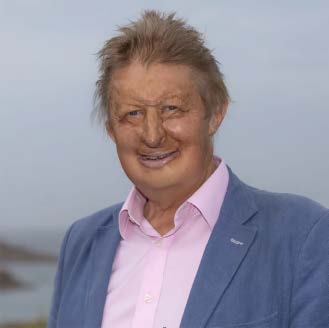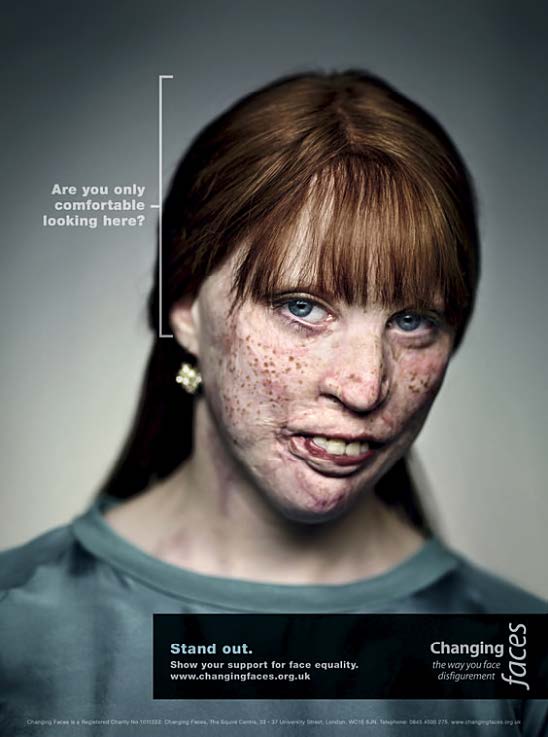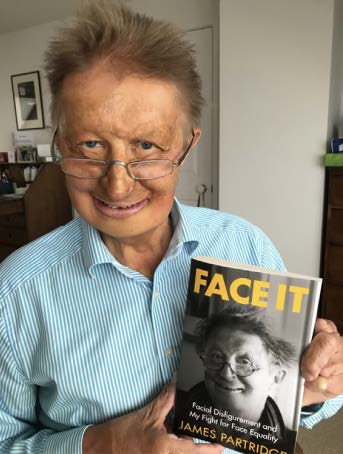FACIAL EQUITY
AND THE LEGACY OF JAMES PARTRIDGE
BY JOHHNY PAYNE
In 2008, the tunnels of the London Underground transportation system were dotted with posters of young people with facial disfigurements.
Are you only comfortable looking here?" one poster read, directing the viewer to the typical-looking hairline of a girl with a disfigured face. These carefully placed introductions to the young people in the displays were a thoughtful attempt to humanize the experience of disfigurement. "
Much has been done in the past 30 years to bring light to the not-often-mentioned social disability experienced by those with facial disfigurements, or "distinguished faces", as author and activist James Partridge describes.
James himself was the victim of a car fire when he was a young man, which left him with a significantly disfigured face. He writes in the latest of his two books, "We (normals)…. believe the person with the stigma (me) is not quite human. On this assumption, we exercise varieties of discrimination, through which we effectively, if often unthinkingly, reduce his life chances. We construct stigma theory, and ideology to explain his inferiority and account for the danger he represents… ".
James passed this past August and leaves behind a legacy of advocacy, framework of empowerment, and insight into the human experience for those experiencing the social stigma of facial disfigurement. James also has to his credit the founding of two charities, Changing Faces and Face Equality International. He has given the past 28 years of his life to campaigning for the equal value of people with "distinguished faces" and for "face equality", a term that he himself coined. He holds an honorary Doctorate, numerous awards, and has been credited with influencing the passing of the American with Disabilities Act and similar legislation in Britain.
In an interview with EP, long-time friend Cheryl Gartley notes an event she attended with James later in his career. "Knowing that we were both to meet at the event, James saw me first. He came directly up to me, confidently introduced himself, and kissed me on both cheeks, as is the British tradition. He did not let others' potential perception of him set the stage for his interactions. He decided how he wanted other people to feel about him, and he helped them to feel that way by the way he interacted with them. James was fond of saying, "I live with my very distinctive face with pride."

PHOTO COURTESY CHRIS GEORGE/THE GUARDIAN
THE FACE OF DISTINCTION: "I live with my very distinctive face with pride." James Partridge died in August.

COMFORT ZONE: (Above) Changing Faces campaigns work toward a society free from prejudice and discrimination and one that respects difference; (Right) James Partridge holds a copy of his new book published in June 2020; he called it "a memoir, a manual, a manifesto."
James' second book, Face It: Facial Disfigurement and My Fight for Face Equality serves as a biography of his life experience and of his work, but also as a guide to those people and organizations who would desire to learn from his success with advocacy. His work on this book is incredibly thoughtful, human, and hopeful. It is an eye-opening walk through the stigmatizing experience of being disfigured. It is also an approachable education into our own biases and practices which perpetuate broken systems of value for our neighboring humans.

James sums up the heart of his work in his final book: "Every human face should carry the same value, because each and every one is fascinating and beautifully made and is owned by a person worthy of equal respect. We all need face equality now. Let's make it happen."•
ABOUT THE AUTHOR: Johnny Payne is the Mental Health Coordinator at the Orange Grove Center in Chattanooga TN.